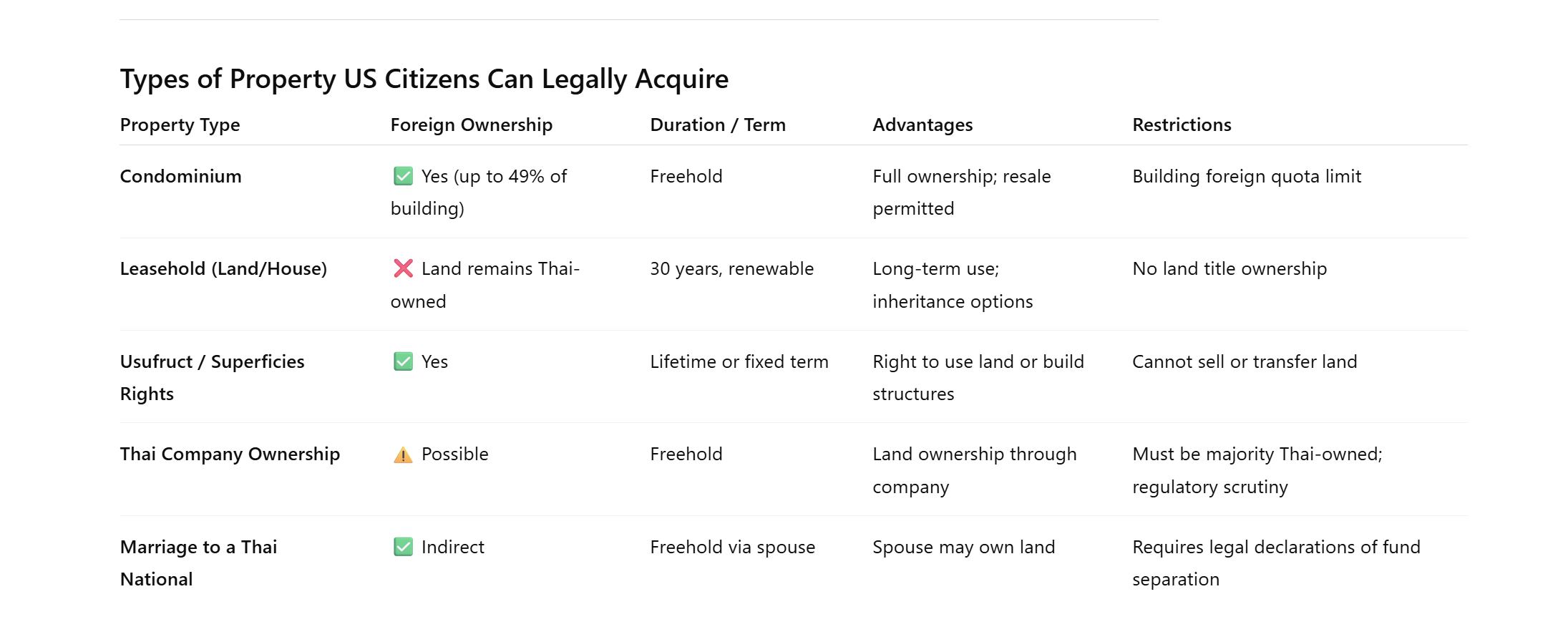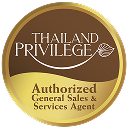Can a US Citizen Buy a House in Thailand? Understanding Property Ownership for Foreigners in 2025
Buying property in Thailand is a long-time dream for many expatriates, especially US citizens drawn by the country’s tropical lifestyle, affordability, and investment potential.
However, Thailand maintains clear regulations governing foreign land ownership. While direct ownership of land or houses is restricted, several legal avenues still allow foreigners to purchase property with confidence and protection.
This 2025 guide outlines everything you need to know — from ownership laws and buying procedures to taxes, financing, and risk management.
Legal Framework for Foreign Property Ownership in Thailand
Restrictions on Land Ownership
Under Thailand’s Land Code, foreign nationals, including US citizens, cannot directly own land in their name. This restriction applies to both residential and commercial plots.
Condominium Ownership
The Condominium Act B.E. 2522 (1979) provides an exception.
Foreigners can legally own condominium units if:
- The total foreign ownership in the building does not exceed 49% of the total sellable area.
- The purchase funds are transferred from overseas and properly recorded via a Foreign Exchange Transaction (FET) Form.
This makes condominiums the most straightforward property type for US citizens to purchase in Thailand.
Types of Property US Citizens Can Legally Acquire

The Property Purchase Process for US Citizens
1. Finding the Right Property
Use reputable real estate agencies or developer listings in Bangkok, Phuket, Chiang Mai, or Hua Hin. Websites such as DDproperty, FazWaz, and Dot Property Thailand offer verified listings.
2. Legal Due Diligence
Engage an independent Thai property lawyer to:
- Verify land title deeds (Chanote)
- Check for liens or encumbrances
- Confirm zoning and building compliance
3. Sales Agreement and Deposit
Once terms are agreed, a Sales and Purchase Agreement (SPA) is drafted.
- Deposits range between 5–10% of the purchase price.
- Ensure the agreement clearly defines payment milestones, handover conditions, and penalties.
4. Transfer of Ownership or Lease Registration
Transfers are completed at the Land Office, where documents are signed, taxes are paid, and ownership or lease rights are registered. Foreign currency transfer receipts (FET forms) must be presented.
Financing and Currency Rules
Cash Purchases vs. Mortgages
Most foreigners pay in full because Thai banks rarely extend mortgages to non-residents.
Alternative options include:
- Financing from international banks or home-country lenders
- Developer payment plans
Foreign Currency Transfers
All property payments by foreigners must:
- Originate from an overseas account,
- Be in foreign currency, and
- Include the note “For the purchase of a condominium unit in Thailand.”
This ensures legal compliance and future repatriation of funds.

Common Challenges for US Citizens
- Language barriers – legal contracts are in Thai; certified translation is essential.
- Unclear land rights – avoid verbal promises; insist on written proof.
- Fraud & scams – use only registered agents and licensed lawyers.
- Lease renewals – confirm renewal terms are contractually stated.
Benefits of Owning Property in Thailand
Lifestyle Advantages
Owning property allows long-term residence and access to Thai investment or long-stay visas, such as the Thailand Privilege Visa or Investment Visa.
Investment Opportunities
Thailand’s property market remains resilient, particularly in Bangkok, Phuket, and the Eastern Economic Corridor.
Condos in central locations often generate 4–8% annual rental yield with strong resale value.

Alternative Ownership Solutions
Setting Up a Thai Company
Foreigners may form a Thai-majority company to purchase land, but nominee structures are illegal. This route requires legitimate business activity and proper accounting.
Marriage to a Thai National
A foreigner married to a Thai citizen may reside on land owned by the spouse. However, the Thai spouse must sign a declaration stating that the purchase was made with non-marital funds.
Tips for US Citizens Considering Property Purchase in Thailand
✅ Conduct independent due diligence on developers and agents.
✅ Hire a licensed Thai lawyer specializing in property law.
✅ Ensure lease or ownership contracts are bilingual and notarized.
✅ Transfer funds legally with proper documentation.
✅ Factor in taxes, maintenance fees, and ownership costs.
FAQs About US Citizens Buying Property in Thailand
Can US citizens buy a house in Thailand?
Not directly — US citizens can purchase condominiums or lease land and homes for long-term use.
Can Americans get a mortgage in Thailand?
Rarely; most buy with cash or use international financing.
Is leasing property a safe option?
Yes, if contracts are drafted by a lawyer and registered at the Land Office.
Are there legal ways for foreigners to own land?
Through Thai companies or marriage to Thai nationals, though both require strict compliance.
How should funds be transferred?
From overseas via foreign currency with a valid FET form issued by the receiving Thai bank.
Owning property in Thailand as a US citizen is possible — but only with the right structure, legal safeguards, and professional guidance.
Condominium purchases and long-term leases remain the safest and most popular routes. With careful planning, buying property in Thailand can be both a lifestyle investment and a financially rewarding decision.
Thinking about purchasing property in Thailand?Our legal and real estate specialists can guide you through every step
From due diligence to transfer of ownership.
📩 Contact us today:hello@thaiinvestmentvisa.com | 🌐 www.thaiinvestmentvisa.com
References
- Thailand Land Code B.E. 2497 (1954)
- Condominium Act B.E. 2522 (1979)
- Bank of Thailand – Foreign Currency Transfer Rules
- Expat Life Thailand – Buying Property in Thailand Guide
- Foreign Buyers Guide Thailand






.jpg)










